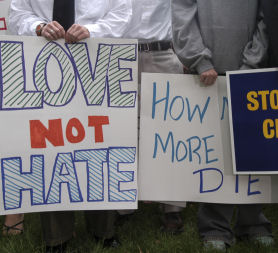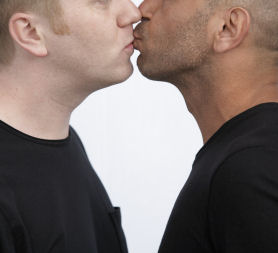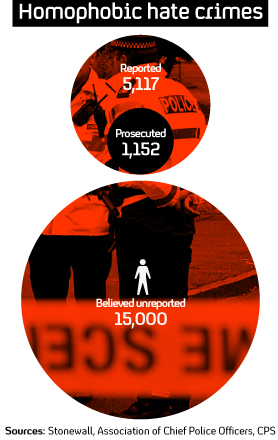Rise in hate crimes masks victims who do not dare to report
As a schoolgirl is convicted of manslaughter for killing a man in London in a homophobic attack, Channel 4 News obtains figures showing the rise in hate crimes reported in the UK.

Ruby Thomas, 18, was yesterday found guilty of the manslaughter of 62-year old gay civil servant Ian Baynham, who died 18 days after a vicious attack on him in London’s Trafalgar Square in September last year. The court heard that she hurled homophobic abuse at Mr Baynham before kicking and stamping on him.
She and another teenager, 20-year old Joel Alexander, were convicted and will be sentenced in the New Year. A third defendant, 18-year old Rachael Burke, was found guilty of affray at an earlier trial.
The shocking attack was one of the most severe of many such crimes committed in the UK last year – dubbed as hate crimes by the police. According to figures released today by the Crown Prosecution Service to Channel 4 News, more than 52,000 hate crime defendants were prosecuted over the four years up to March 2010, a rise on 2009’s figures of 49,000.
Figures released last week by the Association of Chief Police Officers (ACPO) showed that just over 2009, more than 50,000 hate crimes were reported to the police. This showed a rise across all types of hate crime – race-related, motivated by sexual orientation, religion or faith, disability or transgender-related, ACPO said.
More crimes
However, Channel 4 News understands that these figures are just the tip of the iceberg because of a major problem with under reporting – particularly for homophobic and transphobic hate crime. And the police and CPS said that if the cases are reported, and make it to court, not only does it help them tackle the problem but also brings justice for victims – with an 82 per cent conviction rate for hate crime defendants last year, according to the CPS.
Read more on one victim's story of a hate crime attack: 'I'm left in fear'
CPS figures show that 3,900 defendants were prosecuted for homophobic hate crimes over the last four years to March 2010 – up from 3,400 for the four years to March 2009. But the organisation has warned that the numbers of people who are victims of homophobic hate crime are actually far higher because of the problem with under reporting.
Dale Simon, Equality Director at the Crown Prosecution Service, told Channel 4 News: “The information we get back is certainly that there is under-reporting and we need to do more to raise awareness, particularly on homophobic hate crime…so that we get the levels up to the levels that we think actually exist in society.”
As many as three in four people who are victims of homophobic hate crime do not report the incident. Research from equality charity Stonewall.
Research by equality charity Stonewall found that as many as three in four people who are victims of homophobic hate crime do not report the incident.
Stonewall spokesman Gary Nunn said: “There’s still a big problem with under-reporting. But we’re trying to instil confidence in the gay and lesbian community – the police will take you seriously.”
Barriers
Ms Simon said that across the board, far more crimes are committed than are actually reported to the police – but stressed that this is a particular problem for hate crimes, and especially homophobic hate crimes, for a number of reasons.
“The main barriers are a previous kind of mistrust of the system – it wasn’t that long ago that homosexuality was illegal – so there’s that inherent mistrust,” she said.
“But also there are the barriers around being ‘outed’ by the process. A lot of people are not out to their families. Do you really want to report an offence that means that everybody then knows about your personal circumstances?”
- Chapters
- descriptions off, selected
- subtitles off, selected
- captions settings, opens captions settings dialog
- captions off, selected
This is a modal window.
This is a modal window. This modal can be closed by pressing the Escape key or activating the close button.
Victim
Andrew Hinchliff, from Wales, was a victim of a homophobic attack three years ago. He reported the attack to police – a full can of lager was thrown through his window – but says not all gay people would feel confident enough to do this.
“Homophobic hate crime is hard to prove,” he said.
When you realise it is aimed at you, you think, who could hate me so much when they don’t even know me? You are targeted as a category, which is frightening. Andrew Hinchliff, homophobic hate crime victim.
“If the perpetrator’s friends say he said nothing homophobic, you just can’t prove it. There are two sorts of gay people – people who are out there, and confident, and will not take abuse, but will still lose their self confidence; and those who were brought up thinking it’s wrong to be gay…I would go to the police but someone else might hesitate.”
Despite his confidence, and good treatment from the police, the case did not make it to court because it could not be proved who carried out the attack.
“When you realise it is aimed at you, you think who could hate me so much when they don’t even know me?” he asked.
“You are targeted as a category, which is frightening.”

Support
There are measures in place to support victims of all hate crimes, including homophobic hate crimes, through the criminal justice system – but Deborah Gold, Chief Executive of Galop, London’s lesbian, gay, bisexual and transgender community safety charity, thinks more could be done.
She said: “There continues to be real difficulty around bringing hate crimes to court. The process for victims is very difficult, and reporting in general is hard.
“While there are hate crimes committed by strangers, hate crimes are often harassment by people you know, such as neighbours. It’s hard to get help, and much harder to report. People see homophobic hate crime as being attacked outside a bar, but it can be things like ongoing abuse from a neighbour – not violent, but insidious.
Put it this way – homophobic hate crime is not going down. We’re not getting less calls. Galop Chief Executive Deborah Gold.
“So for this reason and others, it’s massively under-reported. That’s our day to day experience at Galop. The figures for hate crime going up can be seen as a success, and police are making an effort. But that’s only part of the story and there’s no way of knowing if that includes more reporting, or more crime, or a mix of the two. Put it this way – it’s not going down. We’re not getting less calls.”

She said that, while the CPS and police are improving, there are other measures that could be put in place, including more training for police to recognise the hate element of the crime, and better support for victims.
“This is an ongoing problem in our society – there is still violence and intimidation going on,” she said.
“There’s been a massive improvement but we are not there yet. We also hear lots about people who have changed their behaviour to avoid abuse – who can’t be themselves because of fear of attacks.”
Measures already in place mean that victims of hate crimes can give evidence via screens or video-links, and can also report the crimes third party, through charities such as Victim Support.
In Wales, Stonewall Cymru and Victim Support have been working together on an awareness-raising project and phone helpline, called It’s No Joke.
Community Liaison Officer Jenny Porter explained to Channel 4 News that the aim was to reach victims who did not report the crime.
“Victims, whether they report it or not, the incident still has that impact on their lives…Reporting and prosecutions of homophobic hate crimes are just the tip of the iceberg. There has been a 25 per cent increase between when the It’s No Joke project started in January, and now, in terms of lesbian, gay, bisexual and transgender people using Victim Support services.
“These are not large numbers but they can seek support regardless of whether they report the crime or not – so it’s reaching the iceberg of people who do not report the crime.”
Why report?
Not all hate crimes, homophobic or otherwise, make it to court for similar reasons as other crimes, such as problems with evidence. But when they do, the conviction rate is high, at around 82 per cent, the CPS said.
However the key issue for police and the CPS, as well as support charities, is the initial report, because of the picture it helps them to paint of hate crime.
Stonewall’s Jenny Porter said: “From the victim’s point of view, what they need is support. From the point of view of raising awareness, it’s important to report it, to police directly or third party. Third party reports won’t get to court but they could prevent other attacks as the police aim to patrol the area where it is reported to have happened.”
Our message to the public is we do take it seriously and we will prosecute it as a hate crime. ACPO spokesman.
A spokesman for ACPO said reporting was essential to help the police tackle hate crime.
“It seems counter intuitive – but we want more reporting,” he said.
“It’s not incidences of hate crime that are going up, but the numbers of people reporting it that are going up. We need to get a real idea of what’s going on – so we think it was a success to get reporting of transgender hate crime up by 50 per cent from 2008. It’s still under reported but we think it’s a good start.”
He said the message to victims of homophobic hate crime was that they would be taken seriously.
“In the past people were worried about coming to the police and the whole criminal justice system, there was a perception that they would not be taken seriously or properly dealt with. But our message to the public is we do take it seriously and we will prosecute it as a hate crime and we will look to the most serious tariffs. We are learning and at the end of the day we want to tackle this particularly hateful, heinous crime.”